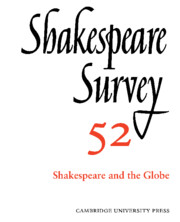Book contents
- Frontmatter
- Reconstructions of the Globe: A Retrospective
- ‘Useful in the Year 1999’: William Poel and Shakespeare’s ‘Build of Stage’
- Reconstructing the Globe: Constructing Ourselves
- From Liturgy to the Globe: the Changing Concept of Space
- The Arithmetic of Memory: Shakespeare’s Theatre and the National Past
- Maximal and Minimal Texts: Shakespeare v. the Globe
- William Shakespeare’s Romeo + Juliet: Everything’s Nice in America?
- Which is the Jew that Shakespeare Knew?: Shylock on the Elizabethan Stage
- A Little Touch of Harry in the Light: Henry V at the New Globe
- Gulls, Cony-Catchers and Cozeners: Twelfth Night and the Elizabethan Underworld
- The Globe, the Court and Measure for Measure
- Macbeth and the Antic Round
- Macbeth / Umabatha: Global Shakespeare in a Post-Colonial Market
- When All is True: Law, History and Problems of Knowledge in Henry VIII
- ‘All which it inherit’: Shakespeare, Globes and Global Media
- ‘Delicious traffick’: Alterity and Exchange on Early Modern Stages
- The 1998 Globe Season
- Shakespeare Performances in England, 1998
- Professional Shakespeare Productions in the British Isles January-December 1997
- The Year's Contributions to Shakespeare Studies 1 Critical Studies
- 2 Shakespeare’s Life, Times, and Stage
- 3 Editions and Textual Studies
- Books Received
- Index
Maximal and Minimal Texts: Shakespeare v. the Globe
Published online by Cambridge University Press: 28 March 2007
- Frontmatter
- Reconstructions of the Globe: A Retrospective
- ‘Useful in the Year 1999’: William Poel and Shakespeare’s ‘Build of Stage’
- Reconstructing the Globe: Constructing Ourselves
- From Liturgy to the Globe: the Changing Concept of Space
- The Arithmetic of Memory: Shakespeare’s Theatre and the National Past
- Maximal and Minimal Texts: Shakespeare v. the Globe
- William Shakespeare’s Romeo + Juliet: Everything’s Nice in America?
- Which is the Jew that Shakespeare Knew?: Shylock on the Elizabethan Stage
- A Little Touch of Harry in the Light: Henry V at the New Globe
- Gulls, Cony-Catchers and Cozeners: Twelfth Night and the Elizabethan Underworld
- The Globe, the Court and Measure for Measure
- Macbeth and the Antic Round
- Macbeth / Umabatha: Global Shakespeare in a Post-Colonial Market
- When All is True: Law, History and Problems of Knowledge in Henry VIII
- ‘All which it inherit’: Shakespeare, Globes and Global Media
- ‘Delicious traffick’: Alterity and Exchange on Early Modern Stages
- The 1998 Globe Season
- Shakespeare Performances in England, 1998
- Professional Shakespeare Productions in the British Isles January-December 1997
- The Year's Contributions to Shakespeare Studies 1 Critical Studies
- 2 Shakespeare’s Life, Times, and Stage
- 3 Editions and Textual Studies
- Books Received
- Index
Summary
In the Induction to Bartholomew Fair, staged at the new Hope in 1614, Jonson set up a mock covenant by which the ‘Spectators, and Hearers’ waiting for the play would accept the performance and ‘agree to remaine in the places, their money or friends have put them in, with patience, for the space of two houres and an halfe, and somewhat more’. Such a specific timing for a mock-legal contract probably reflects the likelihood that Jonson, unlike most of his contemporaries, owned a watch. More likely it reflects his selfconscious awareness of the length of time the performance was expected to take, and possibly some discomfort at its likely duration. Two hours was the standard time for a performance. For The Alchemist with the King’s Men his prologue boasted that it took only ‘two short houres’. The distinctly apologetic tone with which he proclaimed the extra half-hour, and the reluctant admission that it might be even longer, is as explicit an apology for excessive length as the convoluted Jonson would ever allow himself to make. Since Bartholomew Fair has as many words as the Folio text of Hamlet, making them the longest plays of the time, his proclamation that the performance would run to less than two and three-quarter hours must have been defensive. Jonson knew what he was saying, however little he may have expected it to be swallowed whole.
- Type
- Chapter
- Information
- Shakespeare Survey , pp. 68 - 87Publisher: Cambridge University PressPrint publication year: 1999
- 9
- Cited by



